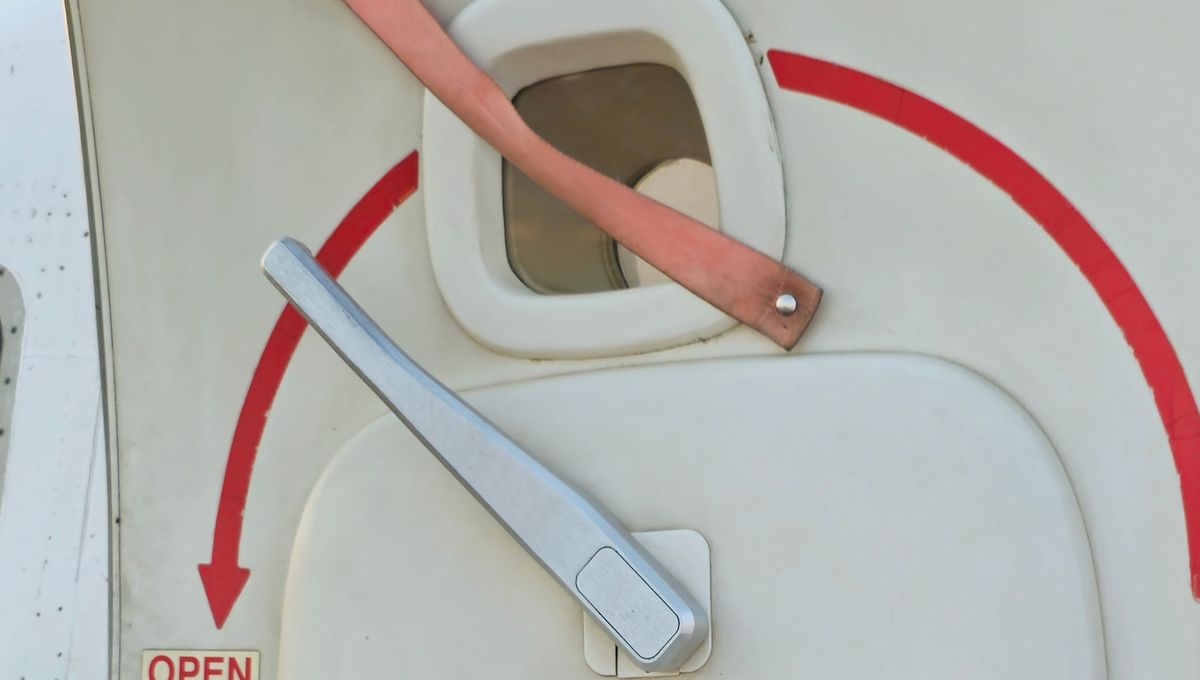
“Cabin crew, arm doors and crosscheck” is the instruction delivered over the plane’s public address. In-flight staff then pull a metal lever on each door before attaching a little red ribbon across the window of every exit, and we’re all thinking the same thing: that flimsy rag can’t be doing much.
In reality, though, this limp piece of low-tech equipment could save someone’s life. Specifically, emergency services attempting to enter the aircraft from the outside rely on the presence of this crimson tape to warn them that the door is armed, and that opening it could place them in serious danger.
By armed, we mean that the plane’s evacuation slide is engaged and ready to be deployed. Opening the door will therefore cause the slide to shoot out and inflate with explosive force, potentially crushing anyone who happens to be standing in front of it.
In accordance with the Federal Aviation Administration’s safety requirements, all commercial aircraft must be fitted with equipment that ensures they can be evacuated in under 90 seconds, even when in the dark and with half of the exits blocked. To facilitate this, evacuation slides must fully inflate in six seconds, operating in temperatures ranging from -54 to 71 °C (-65 to 160 °F) and in winds of up to 25 knots (46.3 kilometers per hour; 28.8 miles per hour).
Prior to departure, the cabin crew will be instructed to arm the doors, at which point they attach the folded-up slide to the door by pulling a lever. Opening the door will therefore cause the slide to fall out, pulling on a lanyard that triggers the inflation mechanism.
“Crosscheck”, meanwhile, is the command for the cabin crew to check that their colleagues stationed at the door opposite their own have successfully armed the exit and placed the warning ribbon across the window.
When a door is opened, a powerful burst of compressed carbon dioxide and nitrogen gas is accelerated through a series of aspirators within the slide, immediately inflating it to about one-third of its capacity. This also creates a vacuum that draws surrounding air into the aspirators through louvers, which then close when the slide is fully inflated a few seconds later.
Firefighters and other rescuers therefore need to know if a door is armed in order to avoid being squished, and the red ribbon across the window is their only clue.
Thankfully, though, the little ribbon is rarely required as the vast majority of flights reach their destination without incident. It’s therefore up to the cabin crew to disarm the doors before they can be opened to allow passengers to leave.
The instruction to perform this task will usually be along the lines of “doors to arrival and crosscheck”, at which point the cabin crew will return the levers to the unarmed position – thus disconnecting the slides from the doors – before removing the red warning ribbon and checking that their colleagues have done the same at all adjacent doors.
At which point, the magic words will be spoken: “You may now disembark the aircraft.”
Source Link: What Is That Red Ribbon Placed Across The Window Of Aircraft Doors For?